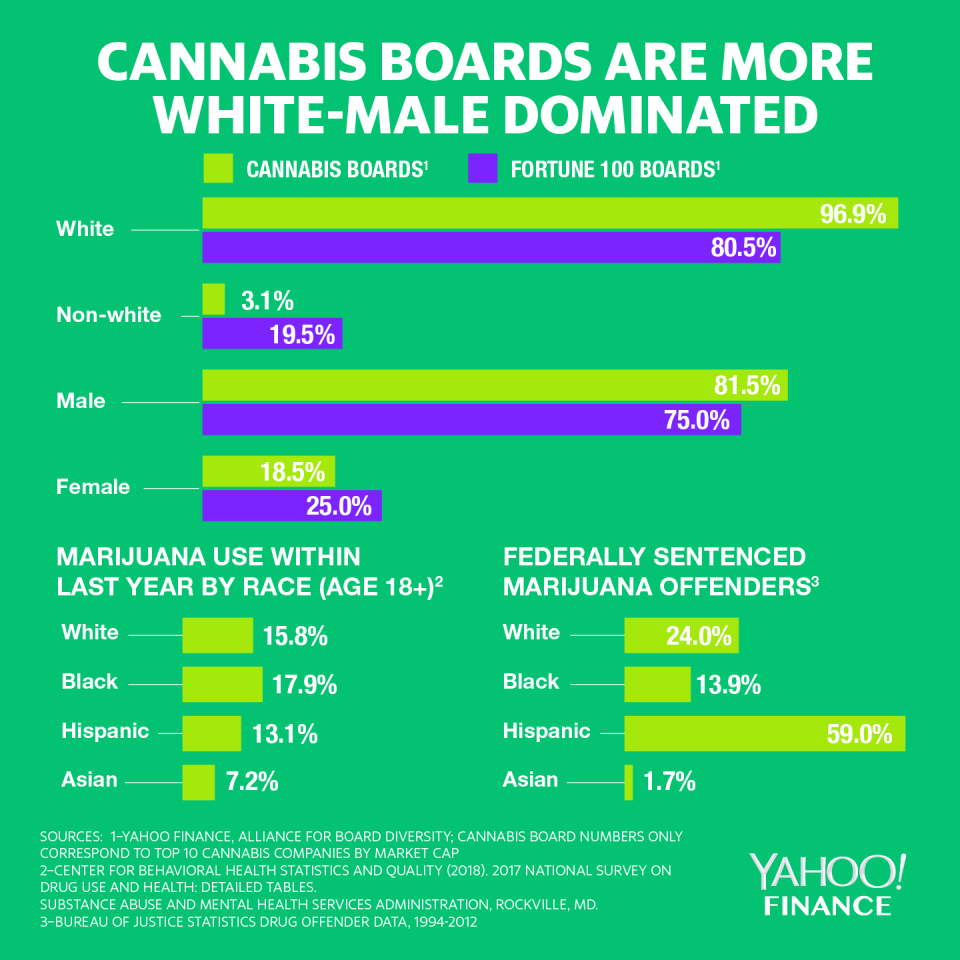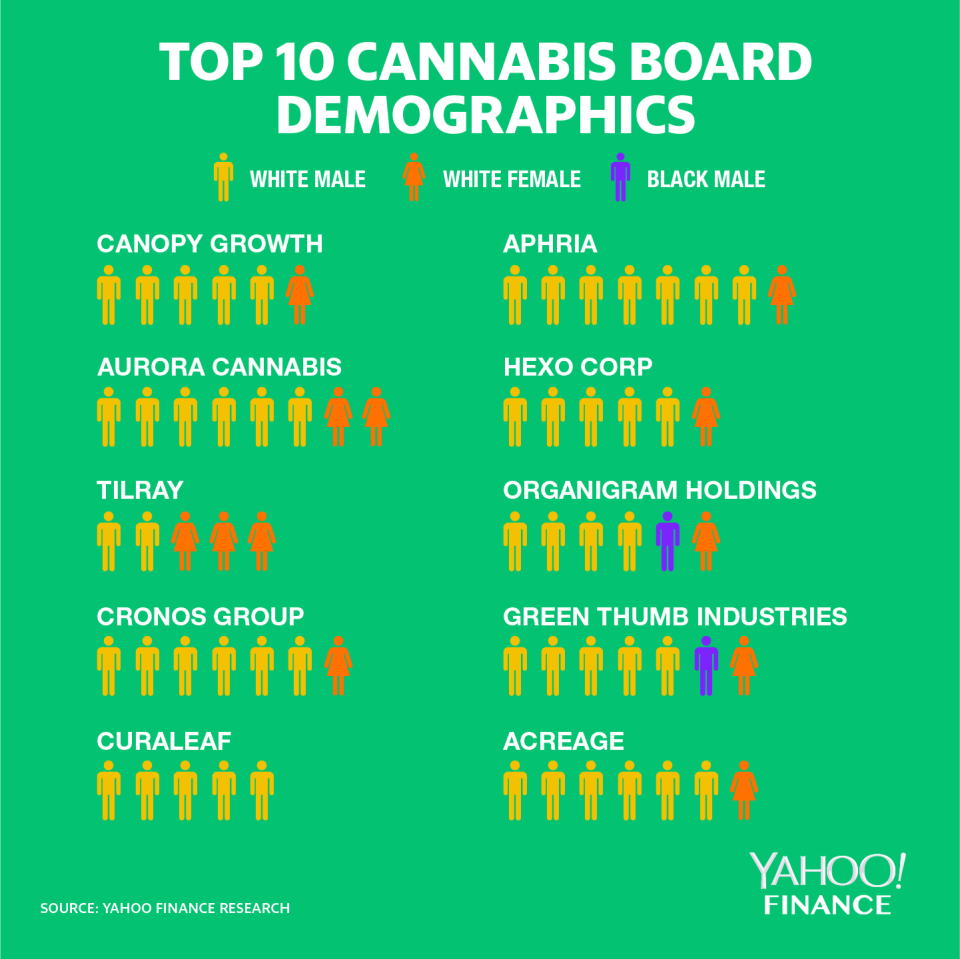Marijuana company boards are shockingly more white than Fortune 100 boards
Marijuana companies have a diversity problem.
Despite selling marijuana and CBD products that are used by and appeal to a diverse set of customers from different cultural and socioeconomic backgrounds, the makeup of leadership at the world’s largest cannabis companies is still mostly white men.
In fact, compared to the boards of Fortune 100 companies, which are already white-male dominated, the boards of the 10 largest publicly traded cannabis companies are strikingly even less diverse.
Only two of the 65 board seats at the top 10 cannabis companies, based on market cap, reviewed by Yahoo Finance are filled by minority members, both are black men. That 3.1% minority representation trails the nearly 20% minority board representation for Fortune 100 companies as measured by the Alliance for Board Diversity by a wide margin.
New Brunswick, Canada-based cannabis producer OrganiGram and Chicago-based vertically integrated grower Green Thumb Industries were the only two companies among the 10 with minority representation at the board level.

Dexter John, 49, who joined OrganiGram’s board in December 2018 said he’s used to being the only black man in the room. The financial regulatory attorney noted that diversity remains an obvious problem in the cannabis sector.
“I’m on a bunch of boards, and they all might be white men,” John tells Yahoo Finance. “They all went to the same boarding school, they all go to the same university and that’s fine, it’s not your fault, but having a diverse board helps you eliminate groupthink. We all see things differently.”
John also pointed out that OrganiGram has a female board member, something that gives the company an edge.
“I look at the skillset and expertise that we bring, and having that viewpoint of everyone in the room, it’s amazing,” he says. “When we make decisions, we can argue but at the end of the day everyone respects everyone.”
In fact, all but one of the top 10 cannabis companies — Massachusetts-based Curaleaf — have at least one female board member. Canada-based Tilray leads the group in female representation with three.

Marijuana use is racially unbiased
While leadership at the top cannabis companies might remain white-male dominated, the customers these companies serve are much more heterogeneous. Adult marijuana use in the U.S. is roughly similar across racial lines, according to a recent national survey on drug use from the U.S. Department of Health and Human Services, which showed roughly 16% of white adults reported using marijuana in the last year. The same measurements for African Americans, at 18%, and Hispanics, at 13%, were not significantly different from white usage.
Yet, as many politicians and criminal justice reform advocacy groups in the U.S. have highlighted, communities of color are disproportionately impacted when it comes to marijuana-related arrests.
Despite the aforementioned similar usage rates, African Americans are nearly four-times more likely than white Americans to be arrested for marijuana possession on average, according to a 2013 ACLU review of incarcerations. In some states, that discrepancy increases to an outcome that’s nearly six times as likely. Additionally, from 1994 to 2012, Hispanics alone accounted for nearly 60% of all federal marijuana sentences, according to data from the Bureau of Justice Statistics.
To address that disparity and history of inequality when it comes to business leader representation, politicians have recently tried to impose solutions through marijuana legalization and decriminalization bills. Most recently, such pushes have largely proven to be sticking points.
In New Jersey, marijuana legalization talks stalled in May after state senators failed to agree on either clearing prior minor drug offenses or boosting equality in cannabis licensing and small business ownership rates. In New York, marijuana legalization efforts broke down after state legislators failed to agree on reallocating tax revenues to communities most impacted by a yearslong war on drugs that disproportionately hit minorities.
Now, the same goal to address inequality around marijuana is being pushed on a national level by Democratic 2020 presidential hopeful Senator Kamala Harris, who alongside House Judiciary Committee Chairman Jerry Nadler, have introduced a bill called The Marijuana Opportunity Reinvestment and Expungement Act. The so-called MORE Act seeks to decriminalize marijuana on a national level, expunge prior convictions and would use a 5% federal cannabis tax to establish an opportunity trust fund meant to direct revenue to assist socially disadvantaged business owners and minimize barriers to entry for minority cannabis entrepreneurs.
To be fair, a majority of the largest cannabis companies are located in Canada, though all have some ties to the U.S. whether it be through partnerships or investments or American board members. Of the three U.S.-based companies, two were 100% white and one — Massachusetts-based Curaleaf — did not include a single minority or female on its five-member board. New York-based Acreage Holdings, which boasts former Speaker of the House John Boehner and former Massachusetts Governor Bill Weld as board members, has one female board member but no minority representation.

As to why the racial discrepancy exists at a higher extreme in cannabis than other industries, John pointed to the fact that a large number of the founders at recently formed cannabis companies tend to surround themselves with people like themselves.
“I hate to say it but a lot of times people don’t trust people who don’t come from their same background. They surround themselves with people they feel comfortable with,” he said. “It really is still an old boys club attitude and it takes time to break that down. And the only way you do that is by having people like me on the board without controversy, and that takes time.”
Zack Guzman is the host of YFi PM as well as a senior writer and on-air reporter covering entrepreneurship, startups, and breaking news at Yahoo Finance. Follow him on Twitter @zGuz.
Read more:
Why the Farm Bill could make 2019 the year of CBD
The Farm Bill could end the multimillion dollar industry of cockfighting
Canopy Growth may have just made its most ambitious claim yet — can it deliver?
Follow Yahoo Finance on Twitter, Facebook, Instagram, Flipboard, SmartNews, LinkedIn, YouTube, and reddit.